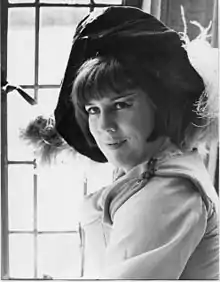Enid Hartle
Enid Hartle (1935–2008) was born in Sheffield in 1935 and studied singing first at the Guildhall School of Music and Drama and after with Vera Rozsa, with whom she had a long and fruitful relationship.

Operatic career
Enid Hartle's early appearances included Mrs Grose "a firmly sketched-in portrait of a comfortable old woman out of her depth" in The Turn of the Screw in London.[1]
She began singing in the chorus of Glyndebourne Festival Opera in 1968 and the following year made her debut on the Glyndebourne Tour, singing Filipyevna in Eugene Onegin by Tchaikovsky. This role was to take her to, among other places, Toronto, Amsterdam, and The Royal Opera House in London. She also took part in the Decca recording of Eugene Onegin, under the direction of Georg Solti.
She was a lyric character mezzo-soprano and was employed by Glyndebourne both in the main season and on the tour for many years, where her roles included:[2]
- La Natura and L'Eternità in La Calisto – Cavalli
- Dryade in Ariadne auf Naxos – Strauss
- Third Lady in The Magic Flute – Mozart
- Forester's wife, Owl, Woodpecker in The Cunning Little Vixen – Janáček
- The Fortune Teller in Arabella – Strauss
- Florence in Albert Herring – Benjamin Britten
- Baba the Turk in The Rake's Progress – Stravinsky.
She created the role of Miss Reid in Winter Cruise by Hans Henkemans which won her great praise from the Dutch press and whose "committed approach" allowed her to present Act 1 "virtually a monologue for her... with consummate skill".[3]
When not at Glyndebourne or abroad Enid sang with Kent Opera, where her roles included:
- Little Buttercup in H.M.S. Pinafore – Gilbert and Sullivan[4]
- Arnalta in The Coronation of Poppea – Monteverdi, directed by Norman Platt
- Maddalena in Rigoletto – Verdi,
- Mistress Quickly in Falstaff – Verdi, both of these Verdi operas directed by Jonathan Miller,
- The Nurse in The Return of Ulysses - Monteverdi
- Nurse in King Priam – Tippett, directed by Nicholas Hytner,
- Auntie in Peter Grimes – Britten,
- Mrs Chin in A Night at the Chinese Opera – Judith Weir.[5]
Many of these operas were conducted by Roger Norrington.
Enid's perceptive and sensitive interpretation of these roles, infused by her love of music and language, made the characters real. She was a keen observer of and commentator on life, and her humour and enormous sense of the ridiculous brought previously unthought-of dimensions to these roles.
One critic noted "Enid Hartle's impeccably timed and cleverly under-played Marquise de Birkenfeld ... which conquered all in the second half. Her piano accompaniment to Marie's song, at once hesitant and bold, was an especial joy, while the agonised examination of her music when Marie and Sulpice broke into the Song of the Regiment roused gales of delighted laughter from the audience."[6]
Concerts and recordings
Although primarily a stage creature, Enid Hartle also sang with many of the leading orchestras at home and abroad, with whom she performed a wide range of works from Handel's Messiah to Berlioz’ Nuits d'Été and Schönberg's Pierrot Lunaire.
In 1973 she took part in a rare performance of van Dieren's Symphony from the Chinese for the BBC in Manchester, conducted by Myer Fredman.[7]
Her recordings include: Ariadne auf Naxos by Strauss with Georg Solti; Suor Angelica by Puccini with Richard Bonynge, La Calisto by Monteverdi realized and conducted by Raymond Leppard, Robinson Crusoe by Offenbach with Alun Francis, and Eugene Onegin by Tchaikovsky with Georg Solti.
On video she appeared in Gilbert & Sullivan's The Sorcerer in 1982,[8] as the Nurse in the Kent Opera King Priam in 1985, and in Tchaikovsky's Queen of Spades from Glyndebourne in 1992.
Enid Hartle died on 1 December 2008.
References
- Blyth, A. (Brief Chronicles, Obituary, and London Opera Diary) Review of Morley College Opera Group production of The Turn of the Screw, February 1966. Opera, April 1966, p334.
- Enid Hartle artist pen portrait, Glyndebourne Season Book, 1985, p155.
- Kasow, Joel. Holland – A Maugham opera. Opera, May 1979, p478-9.
- Milnes, R. Review of H.M.S. Pinafore at Canterbury in December 1973. Opera, February 1974: "Enid Hartle's north country Buttercup was richly comic".
- Kent Opera, Twentieth Anniversary. Artist biographies in Programme booklet for the King's Theatre Southsea, June 1989 unnumbered.
- Forbes, E. Review of La FiIle du regiment by Northern Ireland Opera Trust at the Grand Opera House, Belfast, March 1983, 665-6.
- Sir Arnold Bax website, Robert Barnett Interviews Myer Fredman. Accessed 25 July 2015.
- Shepherd, Marc. The Brent Walker Sorcerer (1982) at A Gilbert and Sullivan Discography, 5 April 2009, accessed 26 August 2010
Sources
The original of this article was compiled based on material prepared by Enid's colleagues and friends, Linda Gray and Sarah Walker.